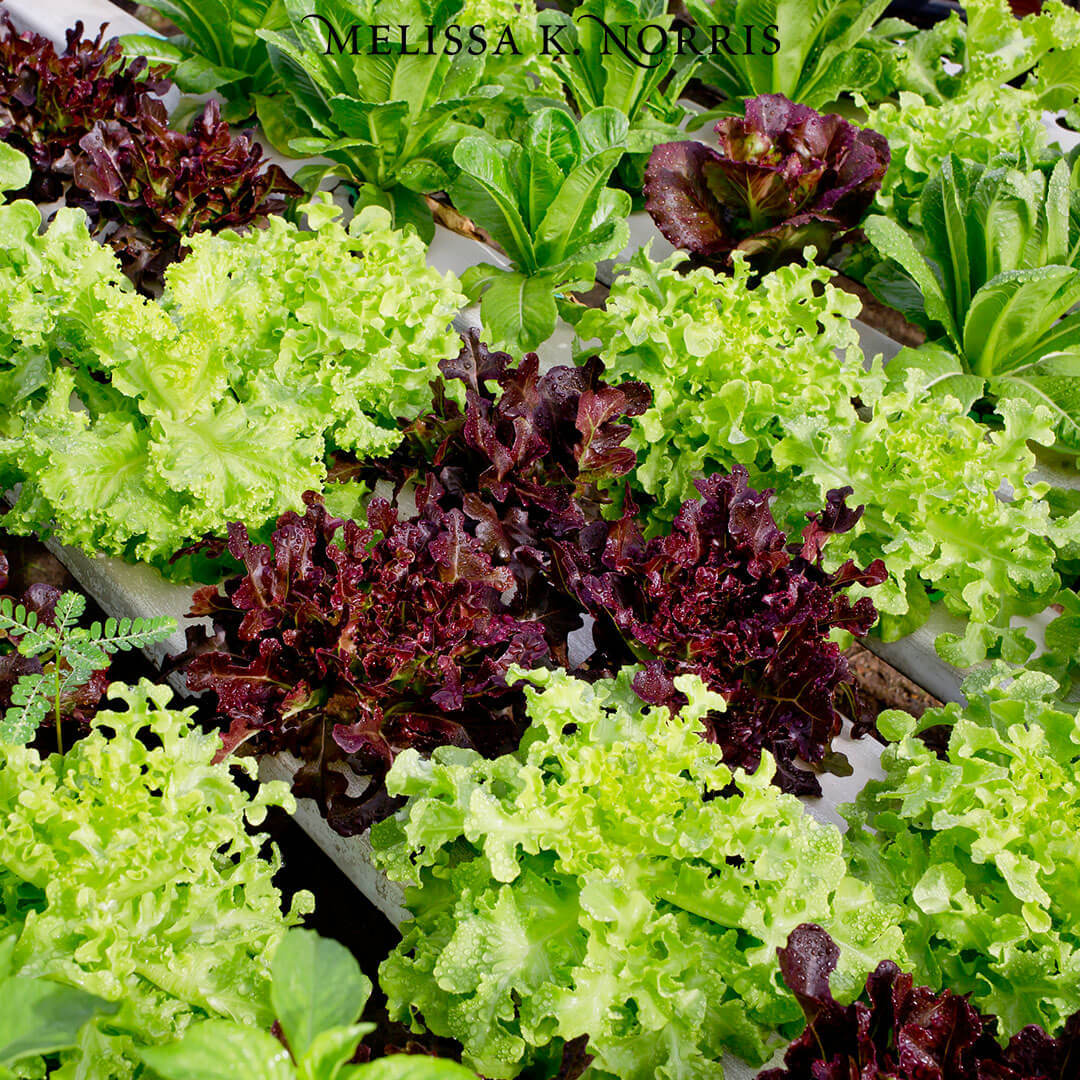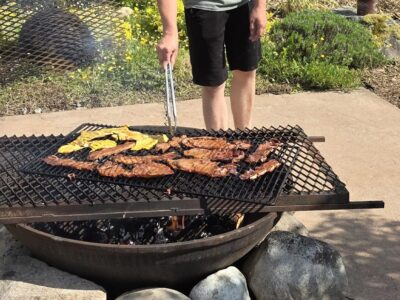Urban homesteading – today we’re talking all about modern homesteading on a small property, because you do not need lots of land to start living a more self-sufficient lifestyle. In fact, my guest today has been homesteading on 1/10 of an acre for years!
Now you may have more land than that. You may have a little bit less. But you’ve probably heard the common gardening myth that you need a lot of acreage or a very large yard to grow food. That’s just not true.
If you are thinking about getting started homesteading, have a really established homestead already, or living off grid and self sustainable is your goal. No matter where you fall on the spectrum, I know you are going to glean inspiration from today’s interview. I know I certainly did!
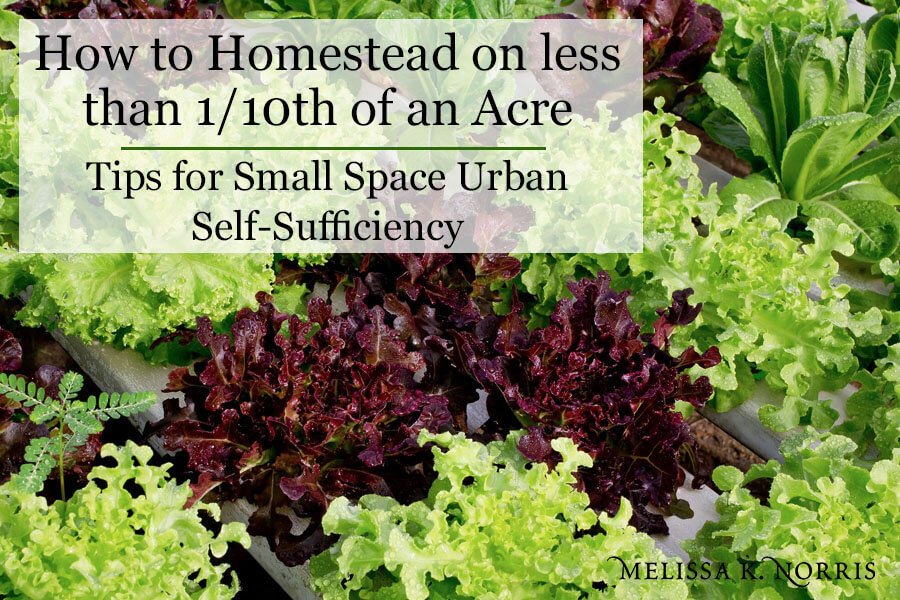
Listen in below to the full podcast, Episode #176 Urban Homesteading – Tips for Small Space Self-Sufficiency , of the Pioneering Today Podcast, where we don’t just inspire you, but give you the clear steps to create the homegrown garden, pantry, kitchen and life you want for your family and homestead.
Table of Contents[Hide][Show]
Tips for Homesteading on less than 1/10th of an Acre
Meet Harold Thornbro: Urban Homesteader & Cancer Survivor
Allow me to introduce you to today’s guest, Harold Thornbro. Harold is a husband, father and grandfather, as well as a colon cancer survivor. Harold says it was years of unhealthy eating choices that eventually led to his cancer diagnosis, and because of that he decided to make some major lifestyle changes and became an urban homesteader on his 1/10 of an acre property in Indiana where he grows an extensive annual and perennial garden using permaculture practices and also raises rabbits and quail.
Now, I’ve been on Harold’s podcast a couple of times, but this is Harold’s first time here so welcome Harold! Can you share with us a little bit about what your modern homesteading journey has been like and what part your cancer diagnosis played in your decision to start homesteading?
Harold: Well, I always had a dream to homestead in the country. Growing up we always had animals and a big garden and all of those things. I just thought that would be the way I would always live quite honestly. But life takes you down different paths sometimes and I got married to a city girl and we started off living in town and I ended up becoming a truck driver and had my own business and spent about 20 years just driving all over the country. With that job comes a lot of really bad habits because first of all, you’re just sitting a lot, and second, you’re usually not eating very well.
In my case, I was eating fast food probably two or three times a day for years! Eventually that caught up with me and in 2012 I ended up in the emergency room with some pretty severe pain in my gut. Within the next few days I was off work and over the next few days I was diagnosed with stage three colon cancer and a pretty large tumor.
I had to have surgery immediately, probably within a week or so. They removed a lot of my colon and then I was scheduled to start chemo.
My first chemo treatment was on my 40th birthday. It didn’t look good. The cancer had spread and on top of that I was having a really hard time with the chemo. The doctor thought I might even be having an allergic reaction, and so I just said, “you know what? I’m just going to try a more natural path.”
I only did three chemo treatments. I don’t go around recommending people just bail out of their chemo cause you know, everybody’s story’s different. But that’s just what I did. I decided that instead I was going to take a different approach and what that meant for me was radically changing my diet and my lifestyle by growing my own food, raising my own meat and getting lots of exercise.
Now, that all all sounds great, right? But the big issue at the time was that I live on a small property in a small town with only 1/10 of an acre. So what was I supposed to do?
I’d been off work for weeks with surgery and chemo and all this stuff. We’d been burning through our savings and we weren’t about to just up and move. That wasn’t an option for us at that point.
So I was sitting around a lot and watching a lot of Youtube and just doing some research on growing things and stuff like that, when I ran across a video on Youtube called the Homegrown Revolution.
It was created by a family who grow their own food on 1/10 of an acre out in California. They grow like 6,000 pounds of food each year and I was pretty impressed by that, so I thought “well, I’ve got 1/10 of an acre. I could grow a lot of food here too and do urban homesteading.”
So it really just sent me down a different path and today I raise meat rabbits and quails for eggs and meat, we grow a lot of vegetables and we have fruit trees and bushes and just a whole lot of stuff going on on this little property.
So that’s what we did. We just changed our lifestyle radically right where we were. I decided to stop making excuses and I began to turn our little old home into a homestead right then and there, because homesteading in urban areas is very doable.
Melissa: I love it. Even though the traditional way of homesteading has always conjured up images of large farms out in the country, you’re proving that it can be done on as little as 1/10 of an acre and you’re doing a lot more than a lot of people would assume you could do in that small of a space.
Harold: For me I just had to really define what I wanted to do as a homestead. We can get so hung up on all the things we can’t do that we let it interfere with the things we can do, and there are so many things you can do in any size space. Beginning urban homesteading is something you should do so you don’t wait until someday.
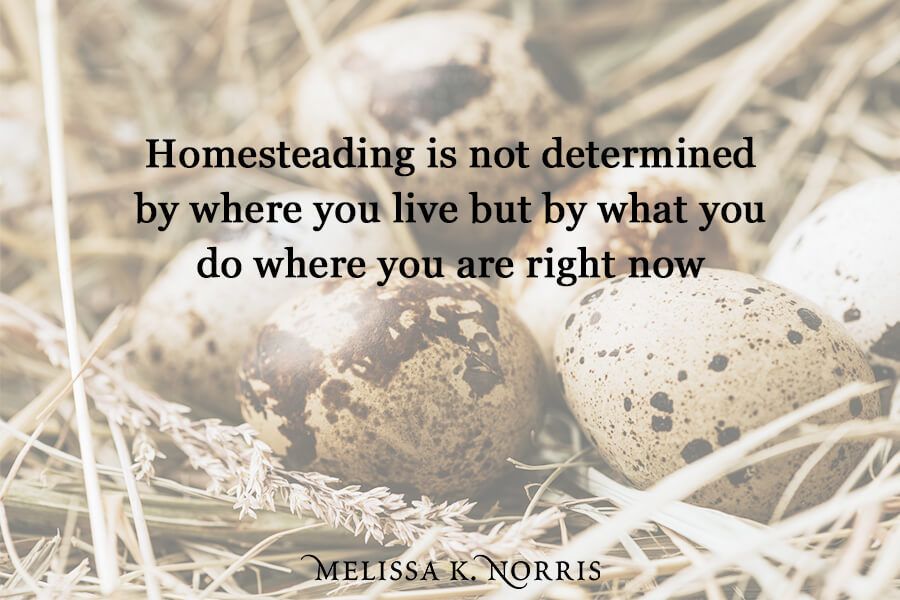
Start with a clear vision and decide what you can do right where you are
For me my vision of modern homesteading was about self sufficiency, it was about sustainability, and it was about eating right.
Once you have a vision of what you want to achieve through homesteading, then pick those things that you can do that will lead you down that path. That’s really what it was like for me when I was deciding what to do. I was like, okay, here’s what I can do. Here’s what I can’t do. What is it that I can do that will help me meet my goals; That will get me eating healthier and move me closer to living a more self sufficient and more sustainable lifestyle.
Melissa: I agree and I think that when talking about modern homesteading, on a small property especially, it helps to define homesteading and what that means to you.
We often have a vision of homesteading being in some log cabin nestled up in the hills with sprawling acreage all around. While this is certainly a romantic vision and some of you may actually have that, there are a lot of different degrees of homesteading and ways to homestead, and it looks a little different for everyone.
Harold: I try to explain it to people like this; Picture a wagon wheel and imagine that the hub on that wagon wheel is your home and your property and then the outer rim of the wheel is what you want to accomplish: the self sufficiency, the sustainability, etc. Well then you have these spokes that connect the hub -your home- to that outer rim. Then think, what would connect your home to the self sufficiency and sustainability or whatever goals you’re pursuing and imagine that each one of the spokes represents something you’re doing.
Maybe one spoke is gardening, one might be raising some animals, perhaps one is preserving or cooking from scratch or making home remedies or even replacing cleaning products with homemade versions. All of these things are spokes in your wheel. The more spokes you have, the more you’re connecting your home to self sufficiency and sustainability.
How to be self sustainable and homestead in a small space
Melissa: So what advice do you have for anyone trying to homestead in a small space or in the city?
Harold: One thing I had to do, or maybe I didn’t do it, but I should have done it, was find out the laws and ordinances for your area. Because it very well could be that you shouldn’t be raising anything or growing a garden in your front yard.
You need to really find out what your situation is and what you can and cannot do legally, because fines can add up or you could even have to tear some things out, which could cost you a lot for nothing in the end. So find those things out first.
Once you know what you’re allowed to do, then you’ll want to evaluate your property.
You need to evaluate your property for a few things; For space, for sunlight, for shade…
Is there a place where you can put a garden? Is there a place where you can plant some trees that aren’t gonna shade out the garden? Is the house shading out your backyard? Then you might have to plant in the front yard.
It probably wouldn’t be a bad idea if you’re planning on planting in the ground to get a soil test too. You can get a test kit from your county extension office and get a soil test and see if there’s anything bad in your soil. But if you’re going to build raised beds like I did right off the bat, it really doesn’t matter because you can make the soil any way you want and start off with perfect soil.
You’ll also want to evaluate for places to put infrastructure because maybe you’re allowed to have chickens and you want to put it in a chicken coop. You’re probably gonna want a compost bin. I recommend everybody compost in some way or another and don’t waste those food scraps!
But not all of homesteading takes place outside. I mean, the kitchen is where we do a lot of our homesteading, right? You want to evaluate for places to store the food, your preserving equipment that you have in your house and things like that.
Just do an evaluation and see what you need and what your setup is. I think that’s a good place to start.
How to Raise Your Own Meat on Less than 1/10th of an Acre
Melissa: You guys produce your own meat with the rabbit and quail. Why did you choose quail over chickens?
Harold: Quail have a smaller footprint. You can raise them in cages and they’re a pretty quiet animal. I live in a town where it’s illegal to have chickens. They’re making lots of noises and going a lot of attention. We raised quail and rabbit because be kept in a smaller area. They have little tractor in the yard for some freedom and we take them out of the cages at times.
“Quail are a dual purpose animal, we get both meat and eggs from them and work well when you don’t have very much space.”
How long does it take quail to produce eggs?
Harold: Quail are producing eggs at 8 weeks of age, much faster than a chicken. Granted the eggs are smaller, so it takes more of them when baking and cooking you need four quail eggs to equal one chicken egg.
The great thing about quail is they’re ready to butcher at 8 weeks of age too. I have a rotation of about a year and a half for the egg layers and then I’m butchering them and bringing in the new quail and so we just kind of rotate them in and out constantly.
How to homestead right wherever you are, one small step at a time
Melissa: So I want to circle back a bit. When you first had stage three cancer, you had done three rounds of chemo and your personal decision was to stop the chemo and focus on changing your eating and lifestyle habits. But there was a period of time between when you decided to make this change and the point where you were actually producing your own food. What were the steps that you took to better your health until you were more self-sufficient and producing that good quality food?
Harold: I immediately got a couple raised beds going and I was growing a little salad and salsa garden pretty quick. I was eating a salad out of my backyard just about every day within a few weeks of this decision. But in the meantime I was buying organic as much as I could afford.
We were going to the farmer’s market and getting some food from there too. And after doing some research, one of the first things I did is I went on a very strict Keto diet and I lost like 45 pounds in a couple months just doing away with the sugars.
I had absolutely no sugar and very little carbs. I had no carbs at first because I was on a strict Keto diet, but then I kind of slowly introduced some of that back into my diet. So I just went radical down that path.
It’s been seven-and-a-half years now since my first diagnosis and I’ve had a few tests and everything’s always come back fine.
Melissa: That’s amazing. I think a lot of times people look at where they’re at now and where they want to be and they feel so far removed from it and so overwhelmed by it all that they don’t make those little micro changes in there. But that’s all it takes. Just one small change at a time.
You obviously had a really great motivator with your cancer diagnosis and all. Hopefully other people can start to make those little changes before a health scare like that.
Harold: Ya, I don’t want people wait till it’s too late. How much better would it have been if I started living this lifestyle and eating right 10 years earlier!
So many people just keep putting it off, putting it off, because they say “I don’t have a place to do this. I’m waiting for one day. I’m going to have that dream homestead and I’m not gonna do anything until then.” And that was me too. Don’t get me wrong. That was me before this. And now I try to tell people, don’t wait. Just start right where you’re at right now. You can do a lot of things right where you’re at.
Even if you’re in an apartment, there’s a lot you can do. Just on my podcast last week, I had a lady on who’s homesteading in a townhouse with almost no backyard, growing things hydroponically in her house, cooking from scratch and doing a lot of homesteading things right there in a townhouse.
You may not be able to do a lot. You may not be able to do everything. But there is no doubt you can do some things, and that’s what I always try to tell people.
Melissa: I completely agree. I just love all the tips and stuff that you’ve shared with us. So please share with us if there’s any additional thoughts that we didn’t touch on that you’re like, oh man, I’ve just gotta share about this. And then let us know where people can connect with you more.
Harold: Yeah, I think it’s important to take some first steps if you’re not currently doing anything. I think one of the things that really makes a homesteader is that they’re not just talking about it, they’re getting out there and they’re doing something. So take some action.
Stop thinking about homesteading and take action now
I tell everybody, if you wanna be a homesteader, you gotta take action. You can’t just think about it. It’s fun to think about. It satisfies us to some degree to think about all the things we’re going to do one day. But you’re not going to be a homesteader unless you get out there and start doing some of these things.
You have to be a doer. Get out there and plant something you’d like to, raise something like a chicken or quail or a rabbit or even worms if you want to start a worm compost bin.
Cook something from scratch. I think that’s a big part of homesteading. So start getting in your kitchen and learning how to cook from scratch. Replace a store-bought item with a homemade version, whether it’s a food item, a household cleaning product or a personal care item. Try doing that and develop some self-sufficiency in that area.
Just do something. One thing. Anything. Once you start doing it, you’ll just do more and more and more. It’s like rolling downhill and it just gets faster and faster and then you can’t get enough of it after a while and before you know it you’ll have become a full-blown homesteader.
I also have some audio lessons on that that I would like to offer for free. I go into some deep discussion about what homesteading is, how to evaluate your property, all those kinds of things; The things you need to do in the very beginning. So I just wanted to offer that as a free gift for your listeners, so click here to get 5 FREE audio lessons on how to get started homesteading.
Melissa: Oh, thank you and thank you so much for coming on, Harold. I really enjoyed listening to your story and I’m just so thrilled that you are thriving and that you were able to beat the cancer. I think that’s just awesome.
Harold: Like I said, I don’t want to discourage anybody from going to the doctor for advice or anything like that. I’m always so careful about that because everybody’s situation is different and I know many people who have followed their doctor’s advice and they’re doing well too. But for me, changing my diet and my lifestyle was the best thing I could have done.
At the end of the day though, you have to always make up your own mind. But even if you’re following your doctor’s advice, eating right is still the right way to go. You can’t go wrong there.
Additional Reading/Listening Resources:
Episode #126 How to Heal Stomach Acid Naturally– My story, how I got off of taking prescription stomach acid medications Part 1
Episode #128 What Happens to Your Body When You Eat Healthy & Cut Out Sugar Part 3 a seasonal & ancestral look at eating naturally and with Keto
Are you urban homesteading or working on becoming self sustainable?
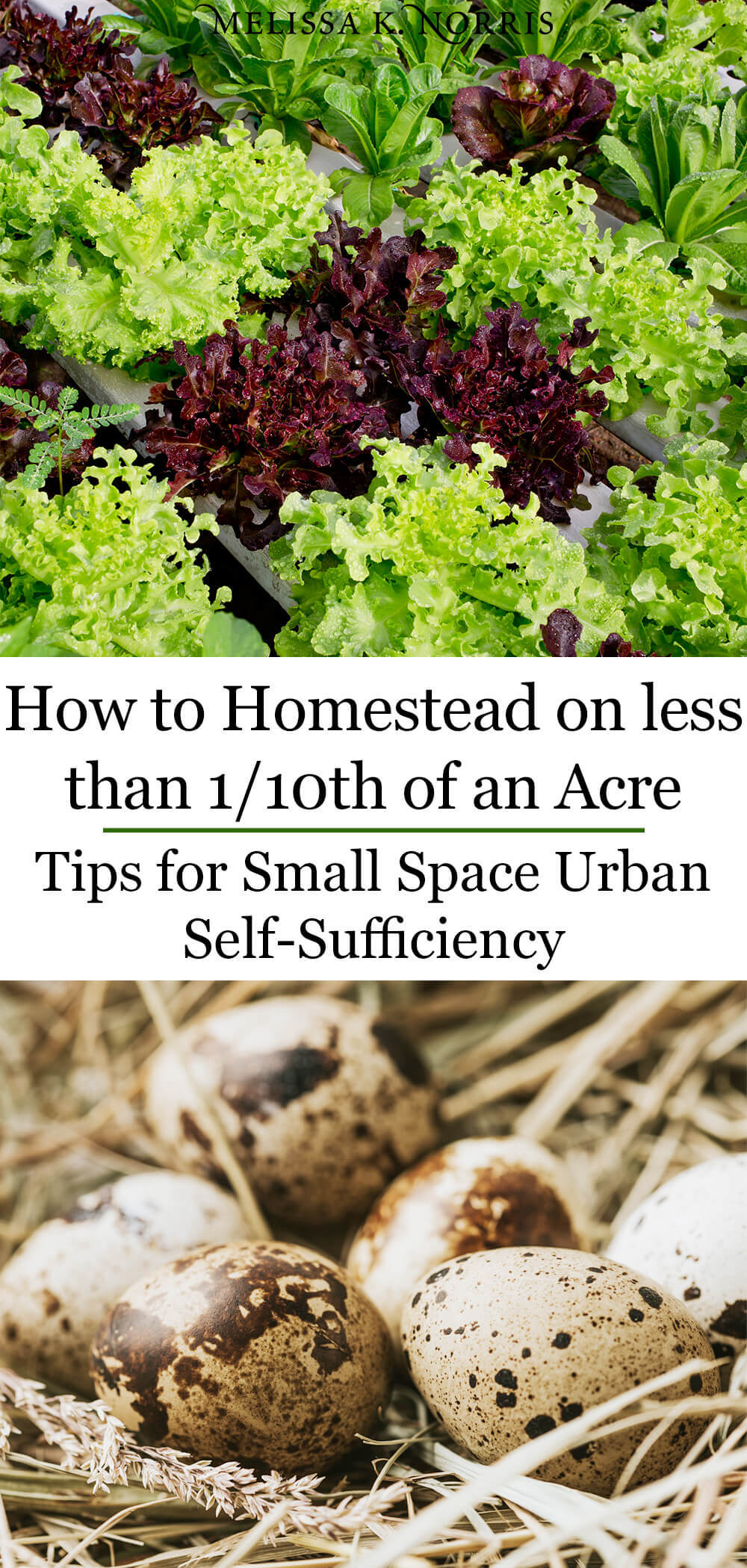
Interested in hearing from more homesteaders? Check out these interviews.
- Aquaponic Gardening & Raising Tilapia with VW Family Farms
- Tips for Homesteading Off-Grid & Life w/out a Fridge or Running Water
- 7 Self-sufficiency and Simple Living Lessons from the Amish
- How to Cook on a Woodstove
- How to Get Everything Done in a Day Without Wasting Time or Getting Distracted
- How Homesteading Helped Lyme Disease Recovery
- Biggest Homestead Mistakes We Made & What to Avoid
- What to do When Homesteading Gets Tough
- Foolproof Methods When Garden Overwhelm Sets In Jessica Sowards of Roots & Refuge
- Maximizing Your Homestead for Profit & Production (with Joel Salatin)
- The Homestead Documentary Project
- Homesteading With Children
- Unplugging for One Year with Rory Feek
